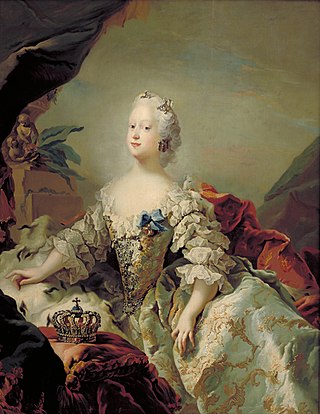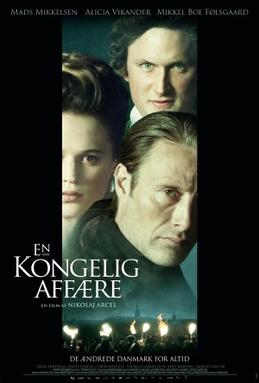
Impeachment is a process by which a legislative body or other legally constituted tribunal initiates charges against a public official for misconduct. It may be understood as a unique process involving both political and legal elements.

Frederick II was King of Denmark and Norway and Duke of Schleswig and Holstein from 1559 until his death in 1588.

Anne-Marie is a Danish princess who was Queen of Greece as the consort of King Constantine II from their marriage on 18 September 1964 until the abolition of the Greek monarchy on 1 June 1973.
A constable is a person holding a particular office, most commonly in law enforcement. The office of constable can vary significantly in different jurisdictions. Constable is commonly the rank of an officer within a police service. Other people may be granted powers of a constable without holding this title.

Frederick V was King of Denmark and Norway and Duke of Schleswig-Holstein from 6 August 1746 until his death in 1766. A member of the House of Oldenburg, he was the son of Christian VI of Denmark and Sophie Magdalene of Brandenburg-Kulmbach.
Chancellor is a title of various official positions in the governments of many countries. The original chancellors were the cancellarii of Roman courts of justice—ushers, who sat at the cancelli of a basilica, which separated the judge and counsel from the audience. A chancellor's office is called a chancellery or chancery. The word is now used in the titles of many various officers in various settings. Nowadays the term is most often used to describe:

The prime minister of Denmark is the head of government in the Kingdom of Denmark comprising the three constituent countries: Denmark, Greenland and the Faroe Islands. Before the creation of the modern office, the kingdom did not initially have a head of government separate from its head of state, namely the monarch, in whom the executive authority was vested. The Constitution of 1849 established a constitutional monarchy by limiting the powers of the monarch and creating the office of premierminister. The inaugural holder of the office was Adam Wilhelm Moltke.

Somerset House is a large Renaissance complex situated on the south side of the Strand in central London, overlooking the River Thames, just east of Waterloo Bridge. The Georgian era quadrangle was built on the site of a Tudor palace originally belonging to the Duke of Somerset in 1547. The present Somerset House was designed by Sir William Chambers, begun in 1776, and was further extended with Victorian era outer wings to the east and west in 1831 and 1856 respectively. The site of Somerset House stood directly on the River Thames until the Victoria Embankment was built in the late 1860s.

The Danish Act of Succession, adopted on 5 June 1953, restricts the throne to those descended from Christian X and his wife, Alexandrine of Mecklenburg-Schwerin, through approved marriages. By a change in the law in 2009, succession is governed by absolute primogeniture.

A lady-in-waiting or court lady is a female personal assistant at a court, attending on a royal woman or a high-ranking noblewoman. Historically, in Europe, a lady-in-waiting was often a noblewoman but of lower rank than the woman to whom she attended. Although she may either have received a retainer or may not have received compensation for the service she rendered, a lady-in-waiting was considered more of a secretary, courtier, or companion to her mistress than a servant.

The Order of the Dannebrog is a Danish order of chivalry instituted in 1671 by Christian V. Until 1808, membership in the Order was limited to fifty members of noble or royal rank, who formed a single class known as White Knights to distinguish them from the Blue Knights who were members of the Order of the Elephant. In 1808, the Order was reformed and divided into four classes. The statute of the Order was amended in 1951 by a Royal Ordinance so that both men and women could be members of the Order. Today, the Order of the Dannebrog is a means of honouring and rewarding the faithful servants of the modern Danish state for meritorious civil or military service, for a particular contribution to the arts, sciences or business life, or for working for Danish interests.

Christiansborg Palace is a palace and government building on the islet of Slotsholmen in central Copenhagen, Denmark. It is the seat of the Danish Parliament, the Danish Prime Minister's Office, and the Supreme Court of Denmark. Also, several parts of the palace are used by the Danish monarch, including the Royal Reception Rooms, the Palace Chapel and the Royal Stables.

Marie Sophie Frederikke of Hesse-Kassel was Queen of Denmark and Norway by marriage to Frederick VI. She served as regent of Denmark during the absence of her spouse in 1814–1815.

Louise of Great Britain was Queen of Denmark and Norway from 1746 until her death, as the first wife of King Frederick V. She was the youngest surviving daughter of King George II of Great Britain and Caroline of Ansbach.

Schmidt Hammer Lassen (SHL) is an international architectural firm founded by a group of Danish architects in 1986 in Aarhus, Denmark. It currently has three offices in Copenhagen and Aarhus in Denmark, as well as Shanghai, China. In 2018, Schmidt Hammer Lassen became part of global architecture and design firm Perkins and Will.

A Royal Affair is a 2012 drama film directed by Nikolaj Arcel, starring Mads Mikkelsen, Alicia Vikander and Mikkel Følsgaard. The story is set in the 18th century, at the court of the mentally ill King Christian VII of Denmark, and focuses on the romance between his wife, Caroline Matilda of Great Britain, and the royal physician Johann Friedrich Struensee.

The Møinichen Mansion is a former town mansion on Købmagergade in central Copenhagen, Denmark. It later served as headquarters of Royal Danish Mail from 1779 until 1912 and was known as the Royal Mail House. Købmagergade Post Office, was located in the building until June 2015 while the Post & Rele Museum was located on the two upper floors from 1907 until 2015. The building was acquired by the PFA pension fund in December 2014 and is in use for both retail and offices.
Court Mistress or Chief Court Mistress is or was the title of the senior lady-in-waiting in the courts of Austria, Denmark, Norway, the Netherlands, Sweden, Imperial Russia, and the German princely and royal courts.

The Royal Household of Denmark is the establishment and the collective departments which supports the monarch and members of the Danish royal family. The Royal Household supports and assists members of the royal family in the planning and in the exercise of their royal duties and prerogatives.















